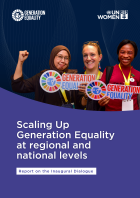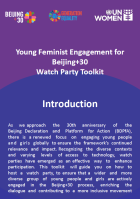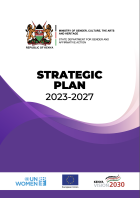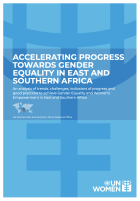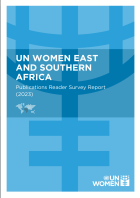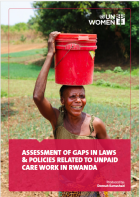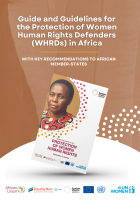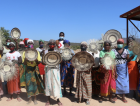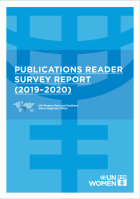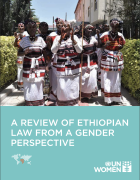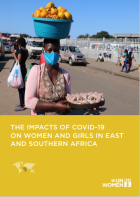1 - 20 of 28 Results
Pagination
Date:
This report summarizes the discussions, outcomes, and recommendations from the Generation Equality Dialogues “Advancing Generation Equality Through Local Action: Scaling up Generation Equality at national and regional levels” held on September 12, 2024.
Date:
The Beijing Declaration and Platform for Action (BDPfA) is a landmark global commitment, adopted by 189 countries in 1995, to advance gender equality, eliminate discrimination, and empower all women and girls.
Date:
This analysis of laws from a gender perspective was undertaken to provide an in-depth understanding of the current legal framework in both Tanzania Mainland and Zanzibar, and to identify gaps and discriminatory provisions with the long-term vision of advocating for legal reform. The analysis explores the vast spectrum of laws to assess their gender responsiveness, and highlights discriminatory provisions and gaps that require repeal, amendment or enactment.
Date:
The Publication is a detailed strategic plan for the period 2023-2-27. It highlights previous achievements, lessons and emerging issues that define the policy direction of the gender sector achieving a society free from gender discrimination and violence
Date:
UN Women has been partnering and working closely with Amhara Bureau of Women, Children and Social Affairs (BoWCSA) to increase women’s effective participation and equal representation in leadership through the “Enhancing Women’s Leadership and Empowerment Project” since 2017 by employing multipronged strategies. Among the strategies, capacity development programme on Transformative Leadership for Gender Equality for women leaders coupled with mentorship support have been employed since the start of the project. So far, UN Women in collaboration with Amhara BoWCSA built the capacity of more than 1300 women leaders. It also linked 109 mentees with 109 mentors through one-to-one mentorship approach. In addition, women leaders’ networking platforms were established at regional, zonal and woreda levels to increase the voice and leadership of women leaders in Amhara region. These interventions boosted the confidence of women leaders to aspire for higher leadership positions as well as promoted gender responsiveness in their respective positions.
Date:
This advocacy brief provides an overview of the trends in terms of Gender Based Violence (GBV) as a human rights violation in the southern Africa sub-region.
Date:
This report highlights the existing social care infrastructure, and the most needed and cost-effective solutions that can contribute to the reduction and redistribution of unpaid care work in Rwanda.
Date:
The Report highlights the imperative and urgent need to have men, along with women, become gender equality activists and work towards violence-free, inclusive societies. An important reflection on masculinity sheds light on how toxic masculinity models not only harm women and girls, but the majority of men and boys too. In this regard, gender equality really matters for both men and women, and requires both to join their efforts to realize it.
Date:
This Policy Brief will explore the results of the mapping of the women’s movement, and the weaknesses, strengths and recommendations of the current civil-society movement as identified during the National Forum and analysis of the mapping.
Date:
UN Women East and Southern Africa Regional Office initiated a biennial survey for 2021-2022 publications to analyze readers' evaluation of the leading publications in terms of several attributes, facilitate continuous improvements in UN Women's publications and draw lessons for conducting future readership surveys. The survey was also meant to consult the audiences on their perception of publications' readability, presentations, design and layout.
Date:
The Report documents our work with communities and stakeholders to advance Gender Equality in Zimbabwe, the challenges, interventions and results achieved
Date:
From cooking and cleaning, to fetching water and firewood or taking care of children and the sick and the elderly, women do at least two and a half times more unpaid household and care work than their counterparts. As a result,they have less time to engage in paid labour due to working longer hours,combining paid and unpaid labour.
Date:
The "Guide and Guidelines on the Protection of Women Human Rights in Africa" is a resource that sets out the legal and policy framework that guarantees the rights of women human rights defenders in Africa and establishes obligations to respect, promote and fulfil these rights by African Member-States.
Date:
The purpose of this booklet is to raise awareness on the African Continental Free Trade Area (AfCFTA) among stakeholders in Zimbabwe, especially women traders. It is intended to facilitate information on opportunities and benefits provided by AfCFTA that women in trade can exploit and use, in pursuit of their business goals whether formally or informally.
Date:
The survey informs the trends to evidence-based and demand-driven approach for ESARO publications. The survey also informs various publication processes, including the implementation of quality assurance guidance and the centralization of the publication process with stronger accountability mechanisms for knowledge production.
Date:
The assessment offers a series of measures for re forming Ethiopian law to ensure that laws are gender sensitive and more effective at ensuring gender equal ity and non-discrimination. Most notable is that a total of 5 laws or provisions must be repealed in whole or in part; 26 laws must be revised or amended and two (2) new laws must be enacted to bring Ethiopia’s legislative framework in line with its regional and international obligations on gender equality and women’s empowerment. The report also emphasizes the need to prioritize the implementation of national laws that comply with gender equality standards, and in this context, recommends one policy measure to ensure that laws fully deliver on women’s rights
Date:
This study builds on UN Women’s achievements and experience in supporting women and girls during the COVID pandemic within the East and Southern Africa Region and other parts of the world.
Date:
UN Women amplified women’s role in the COVID-19 response highlighting the significant leadership roles women played in leading the response efforts in materials on COVID-19 prevention disseminated in local languages and hand washing facilities were constructed in 6 elementary schools. 528 returnee migrant women workers from the Middle East and domestic workers across Addis Ababa have been provided with basic sanitation and hygiene training and raising awareness on the disproportionate impact of COVID-19 on women, girls, and vulnerable and marginalized groups.
Date:
This factsheet offers some insights into migrant women’s experiences in Niger, based on the limited data that is available on this topic. It was prouced as part of the Making Migration Safe for Women programme which aims to ensure that migration is safe for women migrating from, into and through Niger and that international norms and standards for protecting and promoting migrant women’s rights are strengthened. Read/Download : EN
Date:
This analytical study covered ten countries in the region and looked at issues of access to justice for women and girls in East and Southern Africa.

